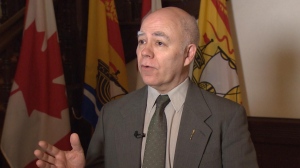Green MLA David Coon wants methadone dispensing fees scrapped

Video and article at the CBC website
Green Party MLA David Coon plans to press the provincial government during departmental budget estimates over changes to how methadone dispensing fees are paid to pharmacists.
The provincial government paid $4.9 million in dispensing fees on behalf of 1,916 clients in 2013-14.
That figure does not include people in methadone treatment, who pay for the drug and the pharmacy fees dispensing on their own or through a workplace drug plan.
Green Party Leader David Coon said he believes the Department of Health is paying too much to pharmacists to dispense methadone and the system could be structured differently. (CBC)
The provincial government has an agreement allowing pharmacies to charge $9.50 for each dose of methadone dispensed. While some patients are allowed to take six doses home, each of those doses is charged a separate dispensing fee.
The Fredericton South MLA said he believes the Department of Health is paying too much to pharmacists to dispense methadone and the system could be structured differently.
“That’s creating a very lucrative business for a handful of pharmacies,” said Coon.
He claims the provincial government could save a minimum of $4 million annually by moving to another model, where methadone dispensing is handled by staff pharmacists operating out from provincial community health centres.
“Put those pharmacists on salary and you eliminate the dispensing fees and you’ve simply got a pharmacist’s salary,” he said.
He said the money saved could be used to avert cuts to mental health or other programs.
A spokesperson for the Department of Health says there are no plans to revisit the dispensing fee agreement with pharmacists.
Methadone is used in the vast majority of cases to treat addiction to opiates. It is a fairly inexpensive drug, costing only about 40 cents a day.
Pharmacists question savings
Paul Blanchard, the executive director of the New Brunswick Pharmacists’ Association, said he questions whether Coon’s idea of allowing pharmacists, working out of community health centres and dispensing methadone, would work.
Blanchard said the provincial government would have to account for costs to set up and staff government-operated pharmacies outside the province’s larger communities.
He said it would also be difficult for many methadone patients to get to a hospital every day.
More than 100 pharmacies around the province now dispense methadone.
Blanchard said the $9.50 dispensing fee is entirely justified because methadone doses vary from patient to patient and have to be mixed in the pharmacy.
Methadone is dispensed on a daily basis to ensure it is not hoarded.
“It’s a lethal drug,” said Blanchard,
Gary Foley, a methadone patient, said if dispensing fee costs can be reduced, the savings could be invested in improvements to methadone treatment. (Connell Smith/CBC)
“If somebody, who is not addicted, takes this medication the consequences could be deadly. It’s not the same as preparing someone’s diabetic medication, for example,” he said.
He said the pharmacist has to know and counsel the patient. In many cases they also have to witness the patient drinking the dose.
Gary Foley, a methadone patient, said he has long been astonished at dispensing costs for the drug.
Foley said he needs methadone to manage back pain and has been taking it for a decade.
The 62-year-old Saint John man said if fee costs can be reduced, the savings could be invested in improvements to methadone treatment.
He said in many cases nurse practitioners consult with patients and then advise the doctor, who prescribes the drug. This is done, claims Foley, without the doctor seeing the patient.
A 2012 study showed by far the greatest share of the costs associated with methadone treatment programs in New Brunswick goes to pharmacy dispensing fees.
In that study Tim Christie, an ethicist with Horizon Health, calculated the average annual cost for methadone for one patient at $127.
He then totalled annual pharmacy fees at $4,288.
The current annual pharmacy charge is lower: $3,467 based on the $9.50 daily dispensing charge agreed to between pharmacists and the province in 2013.